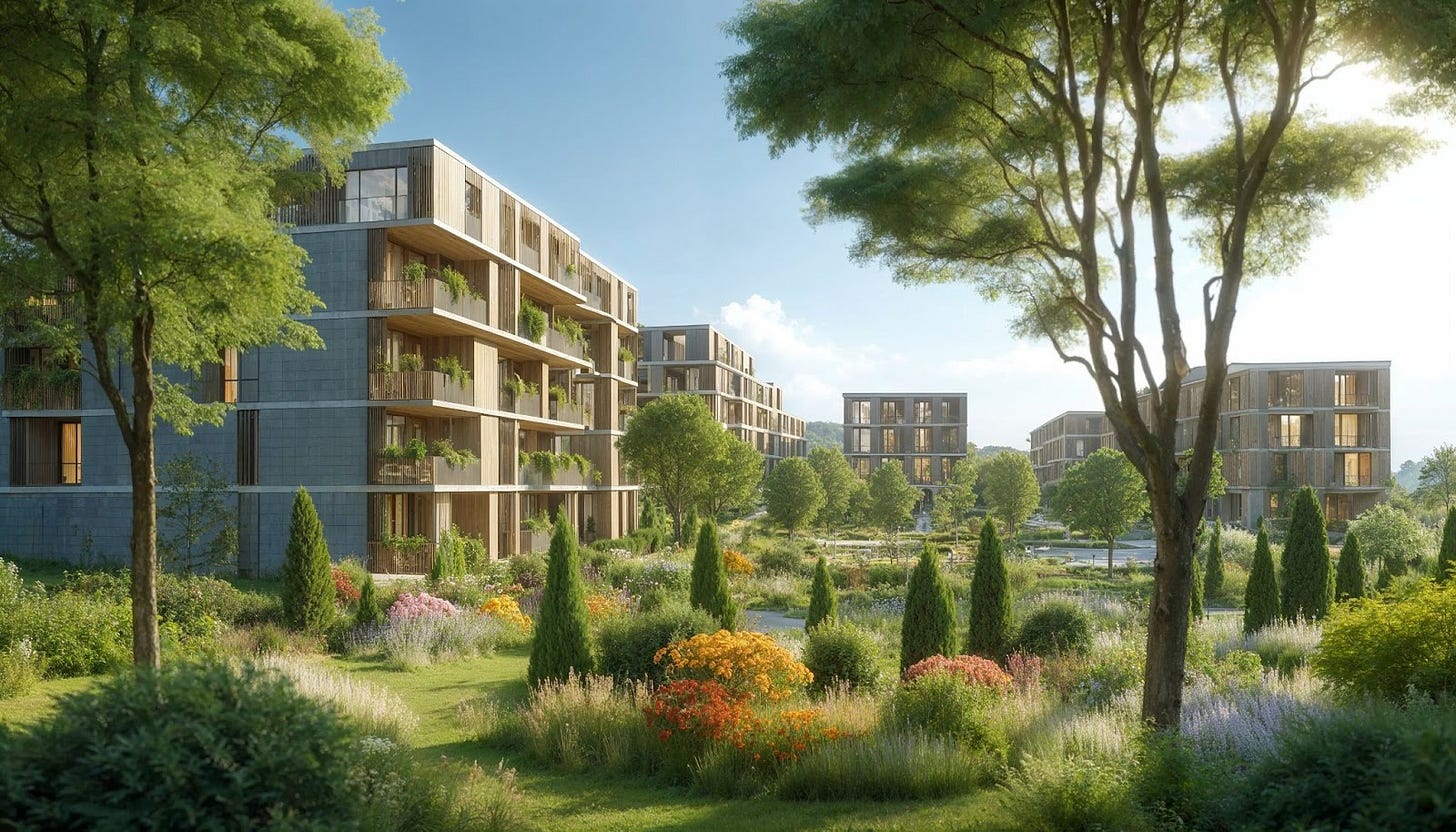Looking for a Mission to Pursue? Try “Democratize Human Flourishing”
Humanity needs a default shared North Star to drive more effective, collective action around doing good. This is that North Star.
In my last Substack post, I delved into the concept of “democratizing human flourishing”. I believe that creating pithy phrases like this is crucial because they help unify problem solvers and support sensemaking and action-taking, especially in confusing times.
Today, I want to expand on this idea and explain why democratizing human flourishing should be the default North Star mission for anyone who wants to do good.
Human flourishing is the experience of holistic well-being, encompassing physical, mental, relational, spiritual, and financial health. Different people may define it differently, but the essence remains the same: achieving peak human existence. While it's hard (and probably unnecessary) to measure flourishing on a 0-100 scale, this concept of “human flourishing” provides a useful framework to assess whether activities contribute to or detract from one's overall well-being.
The think tank and collective action network Humanity 2.0 recently released a comprehensive framework for human flourishing that I think is the most valuable framework to reference:
This framework is the result of several years of co-thinking and iteration by leading flourishing thinkers and practitioners from Harvard, Oxford, Boston College, UPenn, and other institutions.
Why “democratizing human flourishing” is the right default mission for humanity
So, why is “democratize human flourishing” the right mission? Because humans matter, and their experiences matter. Despite the progress made in improving living standards, flourishing remains a privilege for many, even in “developed” nations like the US. This isn't just about access to basic necessities like food and water; it's about the quality of these essentials, having strong relationships, and having a meaningful life purpose. For many, this level of flourishing is still out of reach, which I consider a significant problem. Also, “democratize human flourishing” is a simple yet comprehensive umbrella mission for any number of missions that we care about, including improving cheap access to quality education, ensuring affordable healthcare, protecting and regenerating the natural environment, and affordably fostering safer neighborhoods.
Human flourishing is a complex, multi-faceted “measure.” But we will figure out a way to measure it. And when we do, it will be obvious how insufficient GDP was as a measure of national health/success. GDP attempts to collapse everything we care about into a single number, but it says nothing about the distribution of wealth or the quality of life. GDP keeps us trapped in a rat race, where the assumption is that more is always better. But that's not how humans work. At some point, we must get out of this myopic view and focus on what truly matters: the holistic well-being of individuals and communities. Democratizing human flourishing moves us beyond simplistic metrics and encourages a more nuanced approach to measuring and improving quality of life.
Democratizing human flourishing is not just better than the mission of increasing wealth or GDP, it’s also better than the mission of “making impact” that is typically thrown around in do-gooder circles. While “make impact” can be vague and can often just mean doing something as surface level as signing a petition or picking up litter, “democratize human flourishing” points to systemically increasing accessibility to the conditions that enable holistic well-being for everyone. It sets a bar for impact that more people should strive to achieve.
- - -
Let’s dive further into the nuance behind each word within the phrase: “democratize human flourishing”
First, why “democratize” human flourishing? Simply “serving” human flourishing is too vague; any business can claim they are doing this. And “accelerating” human flourishing is also too vague because someone merely increasing the flourishing for the wealthy can say they are doing this. “Democratize”, however, points to a net increase in the accessibility of a “facilitator” of human flourishing. If all you're doing is creating a competitor of equal quality and cost to other competitors, and you're not filling gaps in accessibility, you're not democratizing human flourishing. Democratization implies innovation and systems change, which is what's needed to make holistic well-being accessible to more people.
Second, why democratize “human” flourishing? Human flourishing is intricately linked with environmental and animal well-being. Protecting our environment and ensuring the welfare of animals are crucial for the sustained flourishing of humans. This interconnected approach makes “human flourishing” a cause that almost any human can support, transcending personal or political differences. It's a mission that fosters unity and collective action toward a better world for all living beings.
Third, why democratize human “flourishing”? Addressing symptoms like “mental health” in isolation can be ineffective because they are often intertwined with other aspects of well-being. Human flourishing requires a diverse range of solutions, recognizing that individuals have unique values, goals, and natures. And unlike other measures that may be narrow or opinionated, human flourishing is pluralistic and acknowledges the complexity of human needs and aspirations. This comprehensive approach ensures that efforts to improve well-being are inclusive, contextually aware, and genuinely beneficial for the long-term health and happiness of all individuals.
- - -
Overall, “democratize human flourishing” is the best possible default mission for anyone trying to seriously make a difference in the world. If you can think of a better one that is both specific enough to drive action and broad enough to unite humanity, let me know.
How to democratize human flourishing (and why it’s challenging to doing so)
Understanding why “democratizing human flourishing” matters is just the first step. The next crucial question is how to achieve this ambitious goal. A “society upgrade entrepreneur” achieves this goal by picking a key “facilitator” of human flourishing and committing to doing whatever it takes to make that facilitator accessible to everyone.
Let’s look at one key facilitator: housing.
Housing as a Facilitator of Human Flourishing
Housing is a critical facilitator of human flourishing because the quality of someone’s housing strongly affects their ability to thrive. High housing costs, which are prevalent in the US and beyond, are a major barrier to flourishing. When people struggle to afford a place to live that is free from mold and other health hazards, it's almost impossible for them to reach their full potential. Therefore, one meaningful way to carry out the mission of “democratizing human flourishing” is to lower the cost of quality, nourishing housing. This mission involves addressing various issues, such as material science breakthroughs, zoning laws, and policies that hinder affordable housing development.
The Importance of Technology in The Democratization Process
Technology plays a crucial role in the mission to democratize human flourishing. Breakthroughs in technology can significantly reduce costs and increase accessibility. For instance, the invention of the washing machine and dryer has democratized human flourishing by freeing up time that would otherwise be spent on the drudgery of laundry. Similarly, the internet has democratized human flourishing by lowering the cost barrier for intellectual development. Today, during the growing heat of the summer in an AC-less apartment, I’m benefitting from a cheap portable air conditioning unit (~$100) that would have been 10x the price 10 years ago. Looking ahead, advances in material sciences and housing construction will democratize human flourishing by making the construction of quality housing 10x cheaper.
What Makes Democratizing Human Flourishing So Hard
While technology is essential, tech breakthroughs alone are not sufficient to fulfill the mission.
From my experience of talking to some of the frontier technologists in the world, the greatest barriers to making housing or education or another extremely costly human flourishing “facilitator” significantly cheaper and higher quality are local policies that prevent the implementation of new technologies. The capture of political institutions by industry incumbents is a real impediment to human flourishing, as they often resist changes that could disrupt their established interests.
Another significant challenge in democratizing human flourishing is the detachment of money from impactful work. Many lucrative jobs are disconnected from real-world improvements, while essential roles related to affordable housing development often go underfunded and unrecognized. These role-players often have to mobilize a diverse coalition of stakeholders, including government, community leaders, NGOs, and influencers, to succeed. This work tends to lack a traditional business model that makes it easy to secure funding. I talk a bit about this problem of funding these kinds of public servants—“society upgrade entrepreneurs”—in my last Substack post.
In sum, each stride in this mission to democratize human flourishing requires a multifaceted approach—combining technological advancements, policy reforms, and community-driven efforts. This multifacetedness makes creating systemic changes that permanently drive down the cost of a facilitator of flourishing challenging.
Human progress has always been about democratizing human flourishing
I want to be clear that while “democratizing human flourishing” is a new meme/concept/phrase, it’s a mission that has been successfully carried out again and again throughout history. I believe it is synonymous with societal improvement, and society has improved in more ways than not over time.
History is littered with examples of human flourishing democratizers. The only difference between the call to action today versus in the past is that in the past, there were different barriers to human flourishing. For example, in the 1960s, racism and discriminatory policies were major obstacles to the human flourishing of Black Americans. Today, one of the greatest impediments to Black Americans’ flourishing (and really, all groups of Americans) is the cost of housing. Those who work on making housing more affordable are modern-day heroes in my book.
Conclusion: Let’s unite humanity around democratizing human flourishing and make Humanity 2.0 a reality
Democratizing human flourishing should be a default North Star for anyone wanting to do good.
This mission encourages contextually aware solutions that consider holistic, long-term human needs, including the need for a flourishing natural environment. While not every proposed solution that claims to “democratize human flourishing” will be perfect, more people aiming to democratize human flourishing ensures that efforts are directed towards creating a better world for everyone.
Ultimately, this mission unifies people across the world and opens up space for meaningful debate on what is truly worth working on. It's a cause that transcends cultural divides and focuses on what genuinely matters: the holistic well-being of humanity.
I personally plan to use this mission of “democratizing human flourishing” as a unifying, shared North Star for innovator guilds that I help kickstart and weave.
According to my friends who created the elegant Community Weaving Framework…
“At the center of each community we see a fire: a source of possibility and energy that draws people in. It is what attracts people in the first place and keeps them coming back. It's our collective identity and sense of belonging. Our shared purpose and core values. It represents the essence of the community.”
There are few better “fires” to serve as a Schelling point for people with talents and a serious commitment to the public good than “democratize human flourishing.”
---
I hope this Substack post provides a helpful primer for you on why democratizing human flourishing is a vital, practical, and unifying mission for anyone looking to make a positive impact in the world.
If the mission resonates with you, please take it and run with it.
Let’s make Humanity 2.0—a world where human flourishing is possible for all—a reality.
Until next time!







I feel like the main strides will happen when people start looking at the issues from a side of humanity instead of a corporate stance. As a people being conditioned to place capitalism over humanity (or even the traditional family model) the advances of everyday technology give us one big edge, we can converge as one and tackle issues bigger than us as a whole. The only ones in our way are corporations
super love it, increase in awareness, the only way out of the craziness of today